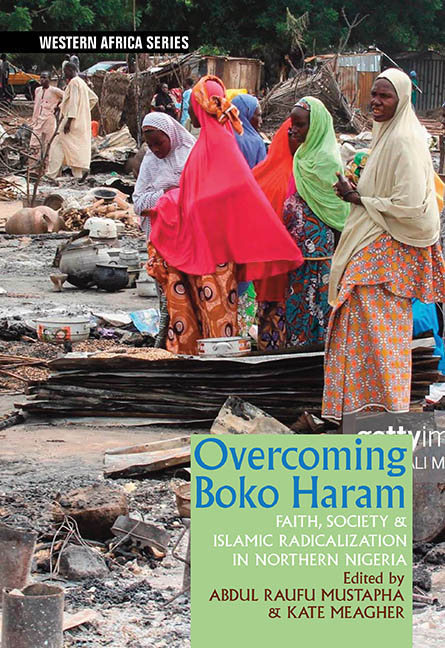Book contents
5 - The effects of security measures on youth radicalization
Published online by Cambridge University Press: 21 March 2020
Summary
Introduction
A primary duty of the Nigerian state is to provide for the security of its citizens. The Constitution of the Federal Republic of Nigeria (1999 as amended) invests the responsibility for security in certain organs of the state, chiefly the police and the armed forces (military). The Nigeria Police Force is responsible for internal security, law and order while the primary roles assigned to the armed forces of Nigeria (AFN) are: to defend Nigeria from external aggression, protect its territorial integrity and secure its borders from violations. The armed forces may also be called upon to suppress insurrection and provide aid to civil authorities to restore order and perform other roles as the National Assembly may prescribe (Section 217 (2) a–d). The authority to offer assistance to civil authority or civil power is referred to in military doctrine as ‘Military Aid to Civil Authority’ (MACA) and ‘Military Aid to Civil Power’ (MACP), respectively. When the military is deployed in an internal security operation (ISO), the goal is to put an end to violence and restore normalcy and law and order as quickly as possible so that the civil power, in this case the Nigeria Police Force, can resume its normal duties. The ability of the Nigerian military to perform these roles has been severely tested in its decade-long struggle against the extremist religious group, Jama‘atu Ahlul Sunna li Da‘wati wal Jihad, popularly referred to as Boko Haram. Not only has Boko Haram inflicted devastation on the Nigerian population, but fighting this brutal and complex insurgency has challenged the capacity and integrity of the Nigerian military, raising questions about whether it is becoming part of the problem rather than a key player in the solution.
In conformity with constitutional provisions and other relevant legal instruments, the Nigerian state has deployed the armed forces, comprising the Nigeria Army (NA), Nigeria Navy (NN) and Nigeria Air Force (NAF), in several conflict and crisis zones throughout the country. The military has been engaged in such operations in every state, including the federal capital, Abuja. These deployments are undertaken as single service operations, joint operations combining two or three services or even multi-agency operations. According to a former Chief of Defence Staff (CDS), ‘the Joint Task Force system has been operating very well.
- Type
- Chapter
- Information
- Overcoming Boko HaramFaith, Society and Islamic Radicalization in Northern Nigeria, pp. 131 - 166Publisher: Boydell & BrewerPrint publication year: 2020

